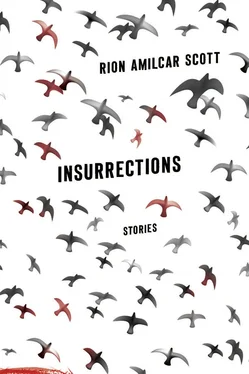Q. . . . . . . .
A. Look, if the world were nice, I’d sing about flowers and trees, but this is the world we got. The world where an unarmed black kid can get shot 37 times on his way home by some trigger-happy pigs. Don’t no one even speak about that no more since that one cop got killed. Didn’t Nietzsche say that he knew his name would be associated with some great horror? Same way I feel, my nigga. I can’t control what people do with my music. Some people jam to it. Some people fuck to it. People will even lead marches to it. And a very small portion will kill cops to it. It’s the soundtrack to the lives we livin’ right here, right now .
Q. . . . . . . .
A. Don’t even call me L’Ouverture no more. My new name is the Black Nietzsche .
Q. . . . . . . .
A. I ain’t answering that question until you call me by my real name .
Q. . . . . . . .
A. Yeah, I’d call a cop if I had to. Call him a motherfucking pig .
Sitting in The Barber’s chair, my heart thumped like a mad drummer sat in there thrashing about. My breathing turned shallow when I heard the clippers buzz.
How you want it, chief?
He said this as if he didn’t know who I was, as if he hadn’t been cutting my hair for the past twelve years or so. A sure sign of barber slippage. It’s not as if I ever once deviated from the usual: a close trim, even all around, except for the back, which was always faded out.
Uh — uh — umm, I stammered, just a shape-up today.
You sure? You looking like Buckwheat. Nah, I’m just playing. You letting it grow out, huh?
I nodded. There was no way, I thought, he could botch a simple shape-up. Even the most otherwise sublime and exquisite haircut is ruined if it’s not crisp around the edges. The shape-up is the most important part; nail that and you can probably fake the rest.
Your brother was in here earlier, The Barber said.
Oh yeah?
We became silent, and the silence terrified me as I sat there perfectly still, giving up my power to a man who had proved his ineptitude over and over.
I heard a click and the buzzing of the clippers as he crouched before me and stared at my hairline. His face was so close to my cheek I felt he was about to kiss me. What really broke my heart was that he was not apathetic. He took just as much care as he did when he was the most excellent barber around. No, he wasn’t apathetic, just pathetic.
I broke the silence to calm my nerves. Yeah, I said, my brother’s about to have his first kid. I’m gonna be an uncle.
The Barber stepped back and snapped off the clippers. I turned my head slightly, looking up at him. His brow was bunched as if in a rage; his face moved in anguish.
Man, he was up in here today and didn’t share that with me. He didn’t share that with me at all.
Uh… I’m sure he meant to.
Yeah, probably, he said as he started cutting into my hairline once more. I’ll just wait for him to bring it up.
He drifted into another silence, and I could hardly stand it. He looked, at moments, like his father, Sonny, Cross River’s other legendary barber. By the time my own father herded my brother and me into that downtown barbershop, Sonny was already on his downslide. Still, my brother and I went to Sonny’s — that was the name of the shop — well into our teens. It was a warm and inviting place with orange walls and mirrors all around. On the wall, the one across from the barbers’ chairs, there was a row of seats where customers read magazines and waited. Above us hung a painting of dogs playing poker, the one with the sneaky dog holding some extra cards under the table in one of his back paws.
Sonny’s chair was the one all the way in the rear of the shop next to a wall that he decorated with dirty postcards from places such as Mexico and Barbados and pictures ripped from nasty magazines: naked and smiling women in inviting poses. I wonder if my father ever thought twice about bringing me into Sonny’s. I’d hate, for instance, if my brother brought my nephew into a place adorned with pornographic images, but it was a different time and no one ever talked about the pictures on Sonny’s wall. I used to discreetly glance over at them every chance I could get away with, but my favorite part of the haircut was always when he spun the chair toward the wall to work on the back of my head and I could stare at the pictures without hiding, storing them in my mind so I could access them later.
Our father took us to Sonny’s after our mother became tired of Dad cutting potholes in our heads. Maybe it wasn’t so warm and inviting, as all my memories involve not wanting to be there. Such as the time, shortly after Marvin Gaye was killed, when I sat next to a fat man who overflowed from his chair. The fat man started speaking, unprompted, of discipline, which was a recurrent theme in the shop. My children, he said, ain’t never gon’ to be too old to get it.
It was a crowded shop that day, and everybody met his sentiment with nods of approval. I was seven, maybe eight.
My daughter’s twenty, the fat man said, and she tried to talk back the other day, I knocked her ass down. Man, I tell you, if I can’t get ’em, the nine millimeter’s gonna get ’em. Like Marvin Gaye.
I flinched and eased from him, just slightly, involuntarily. This time the fat man was met with a silence that carried throughout his haircut.
Sonny gave the fat man the most exquisite cut, one that seemed far beyond his range at the time, one that allowed everyone to glimpse his greatness. And as the man left, Sonny wished him a good day. He pointed to me and I climbed into his barber’s chair. Sonny leaned into my ear and in a voice just above a whisper he grumbled, That guy’s a fool.
An eruption of conversation and mockery overflowed all around the shop.
Sure is a fool, ain’t he?
When that dumb nigga get arrested for killing his kids, I’m testifying like shit.
I’ll buck ’em down like Marvin Gaye’s dad, ’cause I’m a tough guy.
I settled into the seat with the calming din of laughter and conversation all around and let Sonny cut my hair. If I remember correctly, it was a mediocre haircut. The fat man, I imagine, was the last time Sonny unleashed the full power of his artistry.
Sometime in my teenage years, Sonny brought his son into the shop to cut heads. I had seen him before, sweeping and taking out trash. This time, though, he was a barber, occupying the chair right next to his dad. Sonny had a look of pure satisfaction on his face watching his son cut. People tended to compliment Sonny on his son’s work, saying things like, Man, you taught that boy well, and Sonny would nod and hide a smile, but even he was astonished at times by the things his son did with a pair of clippers. You could tell by the brief widening of his eyes.
All the young customers flocked to Sonny Jr., and as word of the young barber spread throughout Cross River, the wait became longer and longer. Once I remember a man with a West African accent sitting in the shop. He talked excitedly and smiled broadly. Said he came all the way from Nigeria to be cut by the finest barber in the world. I swore he was bullshitting, but the way this man cut…
His name was Sonny Beaumont Jr., though in those years we all started to refer to him as The Barber, and when you said it, everyone knew immediately who you were talking about. To call him anything else was absurd.
Sonny always looked on in pride until, one day in my late teens, his son left to open his own shop on the Southside. Cross River Cutz he called it, and Sonny would look grave and shake his head the few times I heard him mention it. Sonny didn’t smile much or laugh after that, but truthfully I don’t know that for sure, because it wasn’t long before my brother and I left Sonny’s for Cross River Cutz.
Читать дальше












